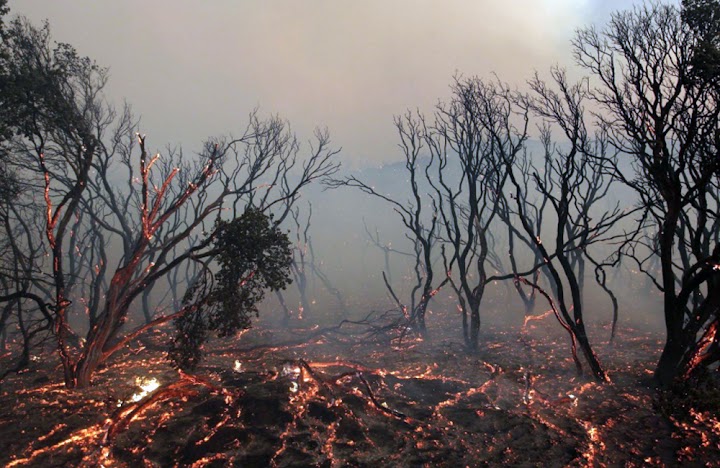 |
| Climate Change Causes Many problems To the World Image credit |
Climate change is having significant, pervasive, and often lasting effects on people and ecosystems all across the world, according to a large study, and it is becoming increasingly clear that there are limits to how much mankind can adapt to a warmer planet.
According to the Intergovernmental Panel on Climate Change (IPCC) research, up to 3.6 billion people live in places that are very vulnerable to climate change, mostly due to extreme heat, heavy rainfall, drought, and weather that sets the stage for wildfires. UN Secretary-General Antonio Guterres described it as "an atlas of human agony" during a press conference.
 |
| Climate Change Effect Image Source |
"We've gained a better knowledge of the limits to adaptability," says Rachel Warren, a lead author on the report from the University of East Anglia in the United Kingdom. "What has come out is a really, really strong warning that the risks at 2°C are several times more than at 1.5°C." At 2°C, many things become far more difficult to manage than at 1.5°." "Delay means death," Guterres said clearly.
Although nearly 200 countries signed the Glasgow Climate Pact at the COP26 summit in November, the globe is still on course for a temperature rise of more than 2°C.
The study found that climate change is already hurting people's physical health, as well as their mental health, for the first time in an IPCC report. The biggest emotional toll, according to Helen Adams of King's College London, comes from extreme weather impacts, such as dealing with flooded homes, but also from "eco-anxiety."
According to the report, the costs of climate change are being borne unequally by the rich and the poor. The world's most vulnerable population is largely found in low-income countries in West, East, and Central Africa, South Asia, and South America, as well as in island nations and Arctic territories. Between 2010 and 2020, deaths from floods, droughts, and storms were found to be 15 times greater in such locations than in the least vulnerable places, which were largely high-income nations such as Canada and the United Kingdom.
"Climate change isn't hiding around the corner waiting to pounce," UN Environment Programme's Inger Anderson said during the press conference, "it's already upon us, raining down blows on billions of people."
According to the analysis, the economic impact of a fast warming globe has been negative overall. However, there have been regional economic benefits, such as increased farming, tourism, and lower energy usage.
 |
| Fire In The Forest Image Credit |
Because we have already baked 1.5°C of warming into our historical greenhouse gas emissions, the 2030s and 2040s will bring an unavoidable increase in dangers for people all across the world. Around a billion people, including those in small island states, will be at risk of coastal impacts such as flooding by mid-century, with some facing an "existential threat" later this century. If the world warms by 2°C, food security will be jeopardized, leading to starvation in some areas.
It is not just humans who are suffering, but also nature: climate change is estimated to be responsible for the extinction of at least two species. If global average temperatures rise by 1.5°C, up to 14% of land-based species will be at risk of extinction in the near future. At 3°C, the percentage rises to 29%.
However, Adams warns against being gloomy in the face of grave predictions, because they are contingent on how much emissions are lowered and how well civilizations adapt. "It's true that things are horrible. "However, it is we, not the climate, who are responsible for the future," she asserts. Holding global warming to 1.5°C "significantly" minimizes climate change losses and costs, but "cannot remove them entirely," according to the report.
Since the last review in 2014, efforts to adapt to a warming world, such as building flood defenses and planting various varieties of crops, have progressed. However, they fall well short of what is required, are inconsistent globally, and there is mounting evidence that adaptation can have harmful side effects, such as coastal erosion caused by sea barriers. According to the paper, "the majority of observed adaptation is fragmented, small in scale, and gradual."
On the fifth day of Russia's invasion of Ukraine, one of the report's authors warns that the conflict risks diverting attention and action away from climate change. "If we're going back to a cold war era, thinking about climate change is something that we don't do with the urgency that we need," says Daniela Schmidt of the University of Bristol in the United Kingdom.
On the fifth day of Russia's invasion of Ukraine, one of the report's authors warns that the conflict risks diverting attention and action away from climate change. "If we're going back to a cold war era, thinking about climate change is something that we don't do with the urgency that we need," says Daniela Schmidt of the University of Bristol in the United Kingdom.
The analysis continues with an urgent message: "Any further delay in concerted anticipatory global action on adaptation and mitigation will miss a narrow and quickly closing window of opportunity to assure a liveable and sustainable future for all."









0 Comments
please do not enter any spam link in the comment box